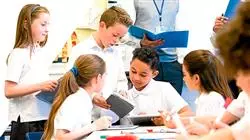University certificate
The world's largest faculty of psychology”
Why study at TECH?
Become a psychologist much better prepared to deal with visual system alterations with this University Expert that TECH Global University offers you"

Sight is one of the most important senses in the learning process. That is why good vision is an indispensable requirement for students during the school period. Otherwise, this could cause them problems during the teaching of reading and writing and even make it impossible for them to complete the tasks that allow them to develop optimal academic performance.
In this sense, the role of psychologists is fundamental, since intervening in its early diagnosis and referral to the appropriate specialists can positively interfere in the child's attitude. Thanks to this University Expert in Visual System and Learning of Literacy Skills, graduates will place special emphasis on the learning process, but, above all, on the development of reading and writing skills from the psychological consultation, in order to know how to detect visual problems, their consequences and the most appropriate way to intervene in each case.
This is a 100% online degree that will provide specialists with the necessary knowledge in symptomatology and problems associated with visual impairment in the office, which will enable them to deal comprehensively with any adversity related to this system in school performance.
This University Expert will enable you to deal with clinical cases of patients with reading and writing problems derived from lack of vision"
This ##ESTUDIO## in Visual System and Learning of Literacy Skills contains the most complete and up-to-date program on the market. The most important features include:
- Practical cases presented by experts in psychology applied to academics
- The graphic, schematic, and practical contents with which they are created, provide scientific and practical information on the disciplines that are essential for professional practice
- Practical exercises where self-assessment can be used to improve learning
- Its special emphasis on innovative methodologies
- Theoretical lessons, questions to the expert, debate forums on controversial topics, and individual reflection assignments
- Content that is accessible from any fixed or portable device with an Internet connection
Thanks to this University Expert you will be up to date in the latest scientific advances in the visual system and its importance in the learning of reading and writing"
The program’s teaching staff includes professionals from sector who contribute their work experience to this educational program, as well as renowned specialists from leading societies and prestigious universities.
Its multimedia content, developed with the latest educational technology, will allow professionals to learn in a contextual and situated learning environment, i.e., a
simulated environment that will provide immersive education programmed to prepare
in real situations.
The design of this program focuses on Problem-Based Learning, by means of which professionals must try to solve the different professional practice situations that arise during the academic year. For this purpose, the student will be assisted by an innovative interactive video system created by renowned and experienced experts.
A 100% online degree, accessible from any device and available 24 hours a day to guarantee an academic experience tailored to your needs"

You will be able to improve your skills in detecting problems in the classroom caused by lack of vision"
Syllabus
This program in Visual System and Literacy Learning has been designed following the guidelines defined by the successful Relearning-based learning methodology. In this way, the most important concepts are reiterated throughout the syllabus, so that graduates will not have to spend extra hours memorizing. In addition, this methodology favors natural and progressive learning and reduces the teaching load.

In the Virtual Classroom you will find additional material to deepen your knowledge of the aspects of the syllabus that you consider most important for your professional improvement"
Module 1. Fundamentals of Learning and School Performance
1.1. Defining Learning
1.1.1. Understanding Learning
1.1.2. Types of Learning
1.2. The Characteristics of Learning
1.2.1. Learning Classification
1.2.2. Theories on Learning
1.3. Learning Assessment
1.3.1. Learning in Childhood
1.3.2. Learning in Adolescence
1.4. Basic Processes in Learning
1.4.1. The Sensation Process in Learning
1.4.2. The Perception Process in Learning
1.5. Attention Processes in Learning
1.5.1. The Process of Attention in Learning
1.5.2. Attention Problems in Learning
1.6. Cognitive Processes and Meta-Cognitive Learning
1.6.1. The Cognitive Process in Learning
1.6.2. The Process of Metacognition in Learning
1.7. Evolution of Psychological Processes in Learning
1.7.1. Origin of Psychological Processes in Learning
1.7.2. Evolution of Psychological Processes in Learning
1.8. The Role of the Family in Education
1.8.1. The family as the First Socializing Agent in Learning
1.8.2. Family Educational Models
1.9. The Educational Context
1.9.1. Features of Non-formal Education
1.9.2. Features of Formal Education
1.10. Learning Difficulties
1.10.1. Difficulties due to Cognitive Impairments
1.10.2. Difficulties in Academic Performance
Module 2. The Visual System and Reading
2.1. Reading Foundations
2.1.1. The Reading Process
2.1.2. Development Associated to Reading
2.2. Processes Involved in Reading
2.2.1. Perceptive Processes
2.2.2. Lexical Processes
2.2.3. Syntactic Processes
2.2.4. Semantic Processes
2.3. Prerequisites for Learning to Read
2.3.1. Perceptive/Motor Skills
2.3.2. Language Skills
2.3.3. Cognitive Skills
2.3.4. Motivational Skills
2.4. The Visual System in Reading I. Accommodation
2.4.1. Ciliary Muscles
2.4.2. Visual Sharpness Accommodation
2.5. Visual system in reading II.Ocular motricity
2.5.1. Extraocular Muscles
2.5.2. Eye Movements Versions
2.5.3. Saccadic Movements
2.5.4. Regression Movements
2.6. The Visual System in Reading III. Binocularity
2.6.1. Extraocular Muscles
2.6.2. Vergences
2.7. Neuropsychological function reading 1: Detection and evaluation
2.8. Neuropsychological Function in Reading II: Intervention
Module 3. The Visual System and Writing
3.1. Reading Foundations
3.1.1. The Writing Process Classification and Symptomatology
3.1.2. Development Associated to Writing
3.2. Planning Process
3.2.1. Assessment
3.2.2. Intervention
3.3. Syntactic Processes
3.3.1. Assessment
3.3.2. Intervention
3.4. Lexical Processes
3.4.1. Assessment
3.4.2. Intervention
3.5. Motor Processes
3.5.1. Assessment
3.5.2. Intervention
3.6. Visual Skills Required for Writing I: Vision
3.6.1. Oculomotricity, Accommodation, Binocularity
3.6.2. Hand-Eye Coordination
3.7. Visual Skills Required for Writing lI: Perception
3.7.1. Laterality - visuospatial organization
3.7.2. Discrimination, Visual and Auditory Memory
3.8. Primitive Reflexes and Writing
3.8.1. Palmar Reflex
3.8.2. Asymmetric Tonic Reflex
3.9. Neuropsychological function writing 1: Detection and evaluation
3.10. Neuropsychological function reading 2: Intervention
Module 4. The Visual System and Learning
4.1. Visual Development and Learning
4.1.1. Evolutionary Development of Vision
4.1.2. Visual Problem Indicators in Learning
4.2. Vision and Academic Failure
4.2.1. Symptomatology of Visual Problems at School
4.2.2. Detection of Visual Problems at School
4.3. Attention Processes and Perceptual Learning
4.3.1. Attention Models
4.3.2. Types of care
4.4. Perceptual Processes in Learning I
4.4.1. Visual Discrimination
4.4.2. Constancy of Form
4.5. Perceptual Processes in Learning II
4.5.1. Visual Closure
4.5.2. Background Figure
4.6. Perceptual Processes in Learning III
4.6.1. Laterality
4.6.2. Visuospatial Organization
4.7. Perceptual Processes in Learning IV: Memory
4.7.1. Visual Memory
4.7.2. Auditory Memory
4.7.3. Multisensorial Memory
4.8. Attention and Visual Perception Problems
4.8.1. Attention Deficit Disorder with or without Hyperactivity
4.8.2. Reading Problems: Delayed Reading Acquisition
4.8.3. Writing Problems
4.9. Problems Associated with Visual Information Processing
4.9.1. Discrimination Difficulties
4.9.2. Closure and Inversion Difficulties
4.10. Problems Associated with Visual Memory
4.10.1. Short-Term Memory Difficulties vs. Long-Term Visual
4.10.2. Difficulties with Other Memory Like Semantic Memory
4.11. Other Vision-Related Learning Problems
4.11.1. Mental Disability and Intellectual Disability
4.11.2. Other Development Disorders
4.12. Educational Intervention in Visual Impairment
4.12.1. Curricular Adaptations to Visual Impairment
4.12.2. Media Adaptations to Visual Impairment

The best opportunity to grow professionally in the field of psychology under the guidance of experts and backed by the prestige that defines TECH Global University"
Postgraduate Diploma in Visual System and Learning of Literacy Skills
Visual system and literacy learning focuses on the teaching process through the use of techniques and tools based on visual tools. The main objective is to improve the learning process of students and adapt the teaching to their individual needs. At TECH Global University we have the largest Faculty of Psychology, from which we offer you the Postgraduate Diploma in Visual System and Literacy Learning, the most complete and updated in the educational market. The postgraduate course is presented as an excellent opportunity for qualification in the area, providing you with wide contents related to the teaching process and the way to improve it using techniques and tools based on the visual system. Through 100% virtual and asynchronous lessons, you will delve into the neurobiological bases of reading and writing, as well as the use of specific tools and technologies, including the Montessori and Doman method.
Specialize in the visual system and the learning of reading and writing
At TECH we have self-regulating schedules, the latest interactive digital content and a team of teachers with wide experience, which makes us a high-class professionalization, at the reach of a click. The program's plan of studies will allow you to deepen your knowledge in the evaluation and diagnosis of reading and writing problems, pedagogical intervention in teaching, language processing, oral comprehension and learning of spelling and grammar in primary and secondary education. In addition, you will delve into the difficulties in literacy acquisition and their intervention strategies, the design of teaching programs and the relationship between reading and critical thinking. Because of this, you will be able to use effective techniques and tools based on the visual system, in order to improve the learning process of students.







